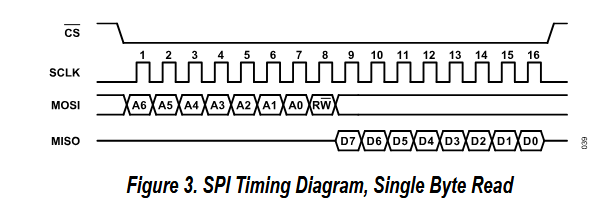I have an EVAL-ADXL372Z that I am connecting to a Seeed XIAO RF52840 (non-SENSE).
This is the wiring map I’m currently using:
XIAO 3V3 → ADXL372 VS and VDDIO
XIAO GND → ADXL372 GND
XIAO D8 (SCK) → ADXL372 SCLK
XIAO D10 (MOSI) → ADXL372 SDI/MOSI
XIAO D9 (MISO) → ADXL372 SDO/MISO
XIAO D2 → ADXL372 CS
I have confirmed continuity on all pins, and also verified that the ADXL372Z VS and VIO are getting 3.29V
This is the sketch I am using in Arduino IDE 2.3.6, to test an SPI read:
// SINGLE READ TEST (DEVID) (cmd 0x80)
#include <SPI.h>
#if defined(ARDUINO_ARCH_NRF52)
#include <Adafruit_TinyUSB.h>
#endif
// XIAO nRF52840 default SPI pins: D8=SCK, D9=MISO, D10=MOSI
static const uint8_t PIN_CS = D2;
uint8_t readReg(uint8_t reg) {
uint8_t val = 0;
SPI.beginTransaction(SPISettings(125000, MSBFIRST, SPI_MODE0)); // MODE 0
digitalWrite(PIN_CS, LOW);
delayMicroseconds(2);
uint8_t cmd = 0x80 | (reg & 0x3F); // READ, MB=0, addr[5:0]
SPI.transfer(cmd); // send 0x80 for reg 0x00
val = SPI.transfer(0x00); // clock in 1 byte
digitalWrite(PIN_CS, HIGH);
SPI.endTransaction();
return val;
}
void setup() {
pinMode(PIN_CS, OUTPUT); digitalWrite(PIN_CS, HIGH);
Serial.begin(115200);
for (uint32_t t=millis(); !Serial && millis()-t<2000;) {}
SPI.begin();
Serial.println("\nADXL372 single read test (MODE 0, cmd 0x80)");
uint8_t v = readReg(0x00); // DEVID_AD
Serial.print("Read DEVID_AD (0x00): 0x"); Serial.println(v, HEX);
Serial.println("Expected non-zero (e.g., 0xAD). If 0x00, bus isn’t getting data back.");
}
void loop() { delay(1000); }
When I run the single read test, I get the following output:
ADXL372 single read test (MODE 0, cmd 0x80)
Read DEVID_AD (0x00): 0x0
Expected non-zero (e.g., 0xAD). If 0x00, bus isn’t getting data back.
Receiving 0x00 for the Read tells me that SPI isn’t getting data.
I also tested the same setup with the ADXL372Z using an I²C ID read (an corresponding wiring), which returned 0xFA. This means I²C is working as expected, but not SPI.
Am I missing something here to get SPI to work?
Thanks in advance
Thanks in advance.


